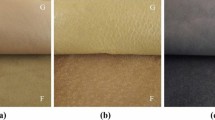Abstract
THE inorganic salts reported to be the most toxic to clothes-moth and carpet-beetle larvæ are the fluorides1, and these have been used on an appreciable scale in the moth-proofing of wool.
This is a preview of subscription content, access via your institution
Access options
Subscribe to this journal
Receive 51 print issues and online access
$199.00 per year
only $3.90 per issue
Buy this article
- Purchase on Springer Link
- Instant access to full article PDF
Prices may be subject to local taxes which are calculated during checkout
Similar content being viewed by others
References
Hartley, R. S., Elsworth, F. F., and Barritt, J., J. Soc. Dyers and Color., 59, 266 (1943).
Waterhouse, D. F., Austral. J. Sci. Res., B, Biol. Sci., 5, 143 (1952).
Lommel, W., and Münzel, H., German Patent 515,956.
Waterhouse, D. F., Austral. J. Sci. Res., B, Biol. Sci., 5, 444 (1952).
Author information
Authors and Affiliations
Rights and permissions
About this article
Cite this article
McPHEE, J. Toxicity of Lithium Salts to Keratin-digesting Insect Larvæ. Nature 180, 1001–1002 (1957). https://doi.org/10.1038/1801001a0
Issue Date:
DOI: https://doi.org/10.1038/1801001a0
Comments
By submitting a comment you agree to abide by our Terms and Community Guidelines. If you find something abusive or that does not comply with our terms or guidelines please flag it as inappropriate.



